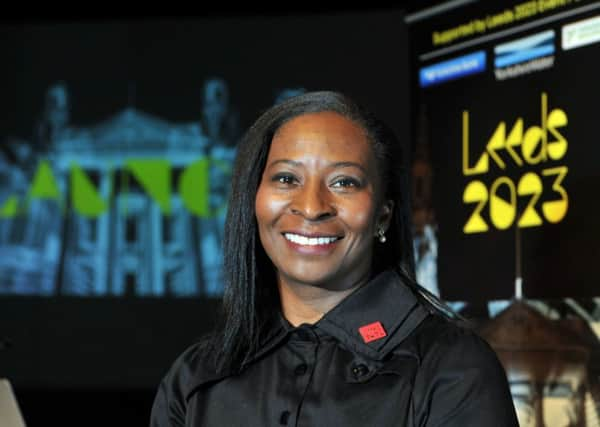Sharon Watson: A city united as Leeds bids to take centre stage


On paper, 100 days appears a long time. In reality it is anything but. Much hard work and planning has already been committed by the bid team and many other supporters to put the building blocks in place for the Leeds bid to be as strong as possible.
Importantly our bid belongs to the people of Leeds, and the wider Yorkshire region, as being named European Capital of Culture in 2023 will benefit us all. And that is why the Leeds 2023 team is today calling on the people of this region to support our bid.
Advertisement
Hide AdAdvertisement
Hide AdThe #MakeLeeds2023 campaign, which marks the start of an exciting programme of events designed to generate further momentum, is asking residents, businesses and communities to make an online pledge to actively spread the word.
People can pledge their support by visiting the bid website – www.leeds2023.co.uk – and by using the hashtag #MakeLeeds2023 on social media. The campaign is also being rolled-out across Leeds with prominent outdoor advertising at high footfall spots in the city centre.
As we launch this call to action, it’s worth reminding readers of The Yorkshire Post why Leeds is bidding to become European Capital of Culture. Our bid presents a huge opportunity for Leeds to highlight and shout about its diversity and reposition the city’s image in the UK and Europe.
Put simply, our bid will benefit the whole city. Evidence shows that the competition can have a transformational effect for the host city, ranging from community cohesion to increased opportunities for employment and the regeneration of communities.
Advertisement
Hide AdAdvertisement
Hide AdLeeds started the process of bidding for the title of European Capital of Culture in early 2014 and over the last three years the city has come together to back it. There is enormous potential offered by the competition and not just for those already actively engaged in the arts.
As was widely publicised at the time, Leeds voted to remain in the EU by a close majority. However, the vote on Brexit did not create division in the city. It simply revealed the differences and contrasts which already exist. As such, the mandate for our bid has always been about the whole city.
A bid for the title of European Capital of Culture offers the opportunity to work with other cities facing the same issues as us around health, wealth and education inequality and to collaborate, creating a new and sustainable future for Leeds that balances a strong economy with a compassionate city.
Leeds already boasts a great deal that deserves to be celebrated. The continued investment in major events such hosting the World Triathlon Series, Leeds International Film Festival and the annual Light Night event, place Leeds on an international stage. Leeds’s West Indian Carnival, Europe’s oldest, celebrates 50 years next month, and is a great example of bringing the city together to celebrate its cultural connections.
Advertisement
Hide AdAdvertisement
Hide AdIt’s important to note that the Leeds bid will also celebrate the wider Yorkshire region’s cultural offer. The unique Yorkshire Sculpture Triangle partnership is a case in point, while the legacy of Hull’s role as UK City of Culture 2017 must continue.
Allied to all of this, the bid provides an opportunity for Leeds to celebrate its relationship with Europe and our distinctive diversity. Our lives have been enriched by the thousands of Europeans who have made this city their home, bringing their cultural identity from food to music, dance, art and design here.
We should not underestimate the legacy that a successful bid would bring. Both Glasgow in 1990 and Liverpool in 2008 saw enormous economic and social benefits that still endure today – for instance, Liverpool’s year as European Capital of Culture 2008 is estimated to have been worth £750m.
In Leeds we believe in a future where our culture in all its forms is valued and experienced by the broadest set of people, and that it should be central to the city’s identity and to its future – both economically and socially.
Advertisement
Hide AdAdvertisement
Hide AdLeeds is home to 140 ethnic groups and we firmly believe that a successful bid will create a lasting legacy, not only by implementing positive change by bringing these communities together and celebrating our diversity, but also by attracting national and international funding and providing a step change in tourism and a catalyst for growth and development.
We are ready to launch our bid for the title on a European stage, showcasing and celebrating the outstanding cultural contribution that Leeds has made to the world. And with your help we can make this happen.
For further information and pledge your support, visit www.leeds2023.co.uk.
Sharon Watson chairs the European Capital of Culture Leeds 2023 steering committee.